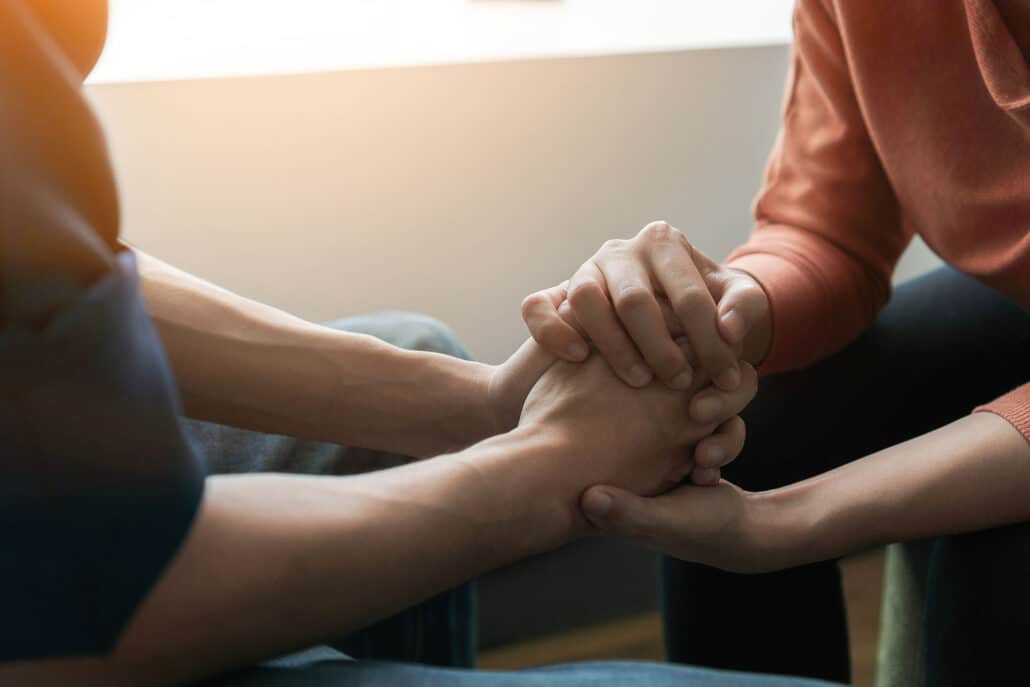Even the healthiest of relationships experience challenges from time to time. But some obstacles are just too overwhelming to tackle as a couple.
Here’s where couples therapy can help. It provides a safe space to navigate those difficulties and build a stronger, more connected bond.
Whether you’re considering premarital counseling or seeking to reignite the spark in your long-term relationship, couples therapy can be the answer.
In this post, you and your partner will learn what to know about couples therapy. Consider our services in Long Island to save your relationship.
Table of Contents
- 1 Couples Therapy vs. Couples Counseling: What’s the Difference?
- 2 Who Is Couples Therapy For?
- 3 What Does Couples Therapy Typically Include?
- 4 What Are Some Approaches Used in Couples Therapy?
- 5 What Are the Benefits of Couples Therapy?
- 6 What Makes a Good Couples Therapist?
- 7 Save Your Relationship Today
Couples Therapy vs. Couples Counseling: What’s the Difference?
While the terms ‘couples therapy’ and ‘couples counseling’ are used interchangeably, there are subtle distinctions.

For starters, relationship counseling (also known as marriage counseling) typically addresses a specific, current issue. The aim is to quickly resolve whatever obstacle is affecting your relationship. As a result, couples counseling usually takes no longer than 6 therapy sessions.
Couples therapy, on the other hand, delves deeper. It looks at the root causes of current relationship issues. Those can be dysfunctional patterns of interactions, emotional baggage, constant conflict, and otherwise.
The goal here isn’t just to fix immediate issues, but to create long-term healthier dynamics. Couples therapy then involves individual growth, the fostering of better communication, and learning how to fulfill each other’s needs.
In turn, couples therapy takes longer. The average is 12 sessions, but that could vary depending on your relationship’s complexity. Some situations, such as infidelity, for example, require more time and effort on everyone’s behalf.
Who Is Couples Therapy For?
Couples therapy is a valuable resource for any couple in a committed relationship, regardless of age, gender, sexual orientation, or marital status.
With that, here are some common scenarios where couples therapy can be particularly helpful:
- Communication Issues
Do you struggle to express your needs or listen to your partner effectively? Frequent arguments or misunderstandings can be a sign that communication needs work.
- Disconnection
Feeling emotionally distant or a lack of intimacy can be a major stressor in a relationship. Couples therapy can help you reconnect and build a deeper emotional bond.
- Life Transitions
Major life changes, like job changes, parenthood, or empty nest syndrome, can put incredible stress on a relationship. Therapy can provide tools to navigate these transitions together.
- Conflict Resolutions
Healthy conflict is inevitable in any relationship. Some couples, however, struggle to resolve disagreements productively. With couples therapy, both of you can learn better conflict-resolution skills.
- Affair Recovery
Rebuilding trust after infidelity requires significant effort. You and your partner will need a safe space to navigate the aftermath. Couples therapy will teach you open communication and how to rebuild your intimacy.

What Does Couples Therapy Typically Include?
Couples therapy utilizes a variety of techniques to address relationship challenges and foster healthier dynamics.
During counseling sessions, therapists often draw from different approaches to create a personalized plan for each couple. In this section, we break down some of the common elements.
1. Creating a Safe Space
The initial sessions focus on establishing trust and safety. Your therapist acts as a neutral facilitator. They actively listen to both partners and encourage open communication.
Being in a supportive environment like that helps a lot. It allows couples to express their concerns and vulnerabilities freely. This way, they let it all out in the open for their therapist to address.
2. Identifying & Expressing Feelings
Miscommunication is easily the most common part of any relationship. Couples often struggle to identify and communicate their emotions effectively.
A couples therapist, in turn, helps them recognize underlying feelings, like anger, hurt, or fear, and express them constructively.
Learning to articulate emotional needs is a crucial step towards building empathy and understanding.
3. Addressing the Past
Sometimes, past experiences can influence present behaviors in a relationship.
Couples therapy may delve into personal histories to understand how your family background, attachment styles, and past relationships shape your current interactions.
By addressing these factors, you can help yourselves break free from unhelpful patterns.
4. Building Skills for Conflict Resolution
As mentioned before, couples therapy equips you with essential skills to manage conflict the right way. This may involve techniques like:
- Active listening
- Identifying underlying needs behind arguments
- Expressing needs assertively
- Developing compromise strategies
With effective communication, disagreements become opportunities for growth rather than hurdles or deal breakers.
5. Focusing on Positive Aspects
While acknowledging problems, therapy primarily focuses on developing solutions. It builds on the positive aspects of your relationship, reminding you of them.
The therapist also works collaboratively with you to identify healthy communication patterns, establish boundaries, and cultivate a sense of teamwork.

What Are Some Approaches Used in Couples Therapy?
Several evidence-based approaches are used in couples therapy sessions. Below, we take a closer look at some of the popular modalities.
Note: Therapists often integrate various techniques to create a personalized approach tailored to your specific relationship needs and goals.
The Gottman Method
Psychologists, John and Julie Gottman developed this method. Their approach emphasizes the importance of emotional connection and building what’s known as ‘love maps’ to understand each other’s needs.
The Gottman method also focuses on building affection and respect. It repairs communication breakdowns and manages negative emotions effectively.
Emotion-Focused Therapy (EFT)
Rooted in attachment theory, EFT prioritizes restoring emotional and physical intimacy. The therapy encourages partners to express their vulnerabilities and underlying emotional needs in a safe space.
Additionally, EFT fosters empathy and a sense of security within a relationship.
Psychodynamic Therapy
This type of psychotherapy delves deeper into the underlying emotional dynamics at play in the relationship.
Psychodynamic therapy explores part experiences and unconscious motivations that might be influencing current behaviors.
Imago Relationship Therapy (IRT)
IRT focuses on identifying and fulfilling each partner’s core needs for love and connection—which often stem from childhood experiences.
This approach utilizes various techniques, like mirroring and validating each other’s feelings. Through them, couples can learn to communicate their needs effectively.
Strength-Based Approach
Ellen Wachtel is the mind behind this approach. In her therapy, she emphasizes identifying and building on the positive changes and aspects of a relationship. As such, the approach encourages self-reflection and a focus on solutions (rather than assigning blame).
Cognitive Behavioral Therapy (CBT)
CBT focuses on identifying negative behavioral patterns and works on changing them.
Some thought processes or mental health problems can contribute to relationship issues, which is what CBT works on. It utilizes techniques, such as positive reinforcement and cognitive restructuring, so couples can develop healthier communication styles.

What Are the Benefits of Couples Therapy?
Technicalities aside, couples therapy offers a wealth of advantages that can significantly improve your relationship and overall well-being. Here are only some of those key benefits:
1. Deeper Understanding
Therapy creates a space for self-reflection and open communication. You’ll gain a clearer understanding of your own needs and desires. Meanwhile, you’ll develop a deeper empathy for your partner’s perspective.
2. Improved Communication
With couples therapy, you’ll learn to express your needs assertively, listen actively, and navigate disagreements productively.
Learning how to communicate helps with all that. You can resolve conflicts better and build more harmonious partnerships.
3. Reduced Distress
Therapy helps identify the root causes of these issues and develop solutions for addressing them. You’ll work through challenges together. In turn, you significantly reduce relationship distress and create a more peaceful dynamic.
4. Enhanced Problem-Solving Skills
Couples therapy equips you with valuable tools for tackling problems together as a team. You’ll learn to identify underlying issues, brainstorm solutions, and reach compromises that work for both of you. These skills will also empower you to navigate future challenges effectively.
5. Strengthened Intimacy & Relationship Wellness
A healthy relationship thrives on a strong foundation of friendship, emotional intimacy, and secure attachment. Couples therapy helps with that.
As a couple, you rediscover the joy of companionship with your partner, fostering a deeper emotional connection that enriches your relationship.
6. Increased Relationship Satisfaction
Ultimately, couples therapy aims to help you create a happier and more fulfilling relationship. It strengthens your bond, addresses underlying issues, and improves communication.
Remember: Couples therapy isn’t just about fixing problems, it’s about investing in the future of your relationship.

What Makes a Good Couples Therapist?
Finding the right fit for your couples therapy journey is crucial.
A good therapist creates a safe space for open communication, free from judgment. They should possess a strong understanding of relationship dynamics and use evidence-based approaches.
Effective communication skills and cultural competency are also key. Look for a licensed therapist with experience in couples counseling and a focus on helping couples navigate challenges.
If you’re an unconventional couple, you should be looking for a therapist who understands those dynamics as well. You need to be able to trust that they won’t judge you for your sexual orientation or relationship practices (whether monogamous or polyamorous).
Save Your Relationship Today
Whatever your relationship is struggling with (be it communication hurdles, disconnection, or unresolved conflicts), you don’t have to go through this alone.
Consider the counseling services at Long Island Treatment Center. Our licensed therapists can provide the safe space you need to rebuild trust, strengthen communication, and reignite the spark in your relationship.
Please contact Long Island Interventions for information about Couples Therapy near you.
Let us save your relationship regardless of its nature. With our help, you and your partner will rediscover the joy of being together.

